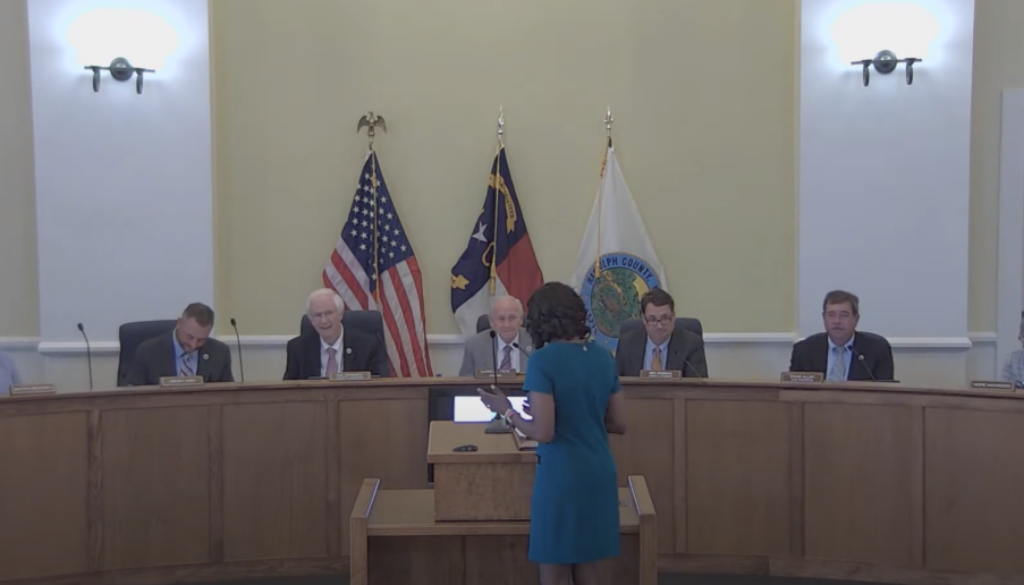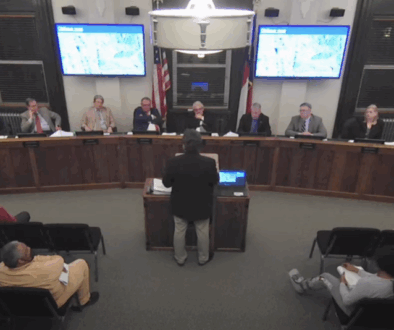Local state of emergency officially terminated in Randolph County
ASHEBORO — The Randolph County Board of Commissioners met Monday where the local State of Emergency was officially terminated, and the board approved multiple financial items.
One of the first items of action that the board took was for Chairman Darrell Frye to officially terminate the local State of Emergency in Randolph County that had been enacted in the face of the COVID-19 pandemic following the end of the statewide State of Emergency in North Carolina.
“Looking back, they always say hindsight is 20/20, but I think we did about as good as we could do through that process,” Frye said. “I think we weathered it and came through it as good or as better as any other county, and that is attributed to a lot of you folks that’s in this room right now, in your various positions working for all the citizens of Randolph County to keep us as safe as possible as we went through that process.”
The board of commissioners also approved three new deputy positions for and funded by the City of Trinity.
“The city of Trinity has approved three new positions, which would bring the total to five,” said Lt. Colonel Steve Myers. “The three new positions were originally discussed on 10-hour shifts, and the Sheriff has asked us to reapproach Trinity, which we did, and reconfigure some salary adjustments for those three deputies for 12-hour shifts, which would bring them in line with our current patrol division and the 12-hour shifts that they work.”
The Farm Food and Family Event Center (F3EC) also received funding support, as the board approved two USDA loans through the Randolph Electric Membership Corporation (REMC) as well as an ARPA rural transformation grant.
“We have an opportunity to work with REMC,” said Assistant County Manager and Finance Officer Will Massie. “They have access to some USDA rural development loan money, and they have been supportive of our agricultural center project. We talked about two different loans. One is specifically for $2 million for the arena space and the second $2 million loan is for the event center space. This maximized the amount we could pull down from the USDA. These loans are for soft costs, not for construction. So we can use them to pay for professional fees, equipment, furniture, fencing, things like that but not for the building itself. 0% interest, but 1% administrative fee. Go up to 10 years. There has to be some sort of security from a USDA perspective, and what REMC suggested was an escrow account where we would put some of the county money with a bank trustee, and that would serve as collateral for the loan until it’s paid off. You can also do a deed of trust for the property.”
As security for the loan, the county can either set up an escrow account with county money with a bank trustee or a deed of trust for the property.
“[The rural transformation grant] is another opportunity to help finance the F3EC project,” Massie said. “The state created a rural transformation grant program from the ARPA money, and one of the programs in that transformation grant was for resiliency. The resilient neighborhoods program and what that will do is provide some funding for the creation of healthy living initiatives, development of health and nutritional education programs, and elimination of food deserts. That is the purpose of the $900,000 grant that is being offered to the county.”
Since the grant is funded through state ARPA funds, the project moves from primarily a local county project to an ARPA project.
Finally, the board of commissioners approved a $20,750 change order for the replacement of non-metallic cable for the Juvenile Day Reporting Center Project.
“This is the space that Child Support moved out of,” said County Engineer Paxton Arthurs. “We’re going in and building four new classrooms for JDRC. We’re renovating probably a third of the building, and the rest of it is going to be used as is.”
According to Arthurs, the building is non-combustible construction with an acoustical drop ceiling throughout, and so the building would typically have electrical in conduit or metal clad cable, however, the current state of the wiring is a lot of non-metallic cables coated in plastic sheathing in the electrical work of the building which isn’t up to code.
However, instead of requiring all the wiring to be replaced, the electrical inspector made a compromise to only change out the cables in the areas where they will be opening up the ceiling, according to Arthurs.
The Randolph County Board of Commissioners will next meet September 6.
 Twitter
Twitter Facebook
Facebook Instagram
Instagram


